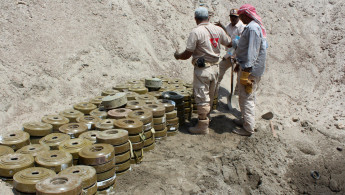South African, European demining experts killed in Yemen
Five demining experts from "South Africa and several European countries" were killed during a mission in Yemen over the weekend, a Saudi-run organisation in charge of the project said on Monday.
Two South Africans, a Croatian, a Bosnian and a Kosovan were killed on Sunday when a vehicle carrying mines to be destroyed exploded in the central province of Marib, the state-run King Salman Humanitarian Aid and Relief Centre (KSRelief) said.
A British national was injured in the explosion, KSRelief said without naming the casualties.
The war between the Houthis and pro-government troops escalated in March 2015, when President Abd Rabbo Mansour Hadi fled into exile in Riyadh and a Saudi-led military coalition intervened.
Since then, the conflict has killed more than 10,000 people and unleashed the world's worst humanitarian crisis, according to the United Nations, although rights group believe the toll to be five times higher.
In April 2017, Human Rights Watch said Yemen's Houthi rebels have killed and maimed hundreds of civilians and prevented many of the displaced from returning to their homes, decrying the group's use of deadly land mines across the war-torn country.
In the report, Human Rights Watch said the rebels - who are allied with the forces of the country's former president - have used landmines in at least six provinces since March 2015, when the Saudi-led coalition launched its military campaign.
Steve Goose, director of the Arms Division at Human Rights Watch, said the Houthis and forces of Yemen's former President Ali Abdullah Saleh "have been flouting the landmine ban at the expense of Yemeni civilians".
He added that Yemen had banned landmines two decades ago.
Kristine Beckerle, an HRW researcher, said the rights group had found two types of anti-personnel mines previously unreported in Yemen, though she noted the Arab coalition had also used banned weapons.
"It's time to actually hold parties accountable, investigate and publicly report on what's going on," she said.
Beckerle spoke at a joint press conference on Yemen with Jamie McGoldrick, the UN human rights coordinator for the war-torn country, during a conference held in the Jordanian capital, Amman.
HRW also released a photo of one of a dozen claymore-type mines, which release steel balls to a distance of about 100 meters (yards), labelled in Chinese and found in areas that were held by Houthi forces.
At least 988 people were either killed or wounded by landmines in Yemen between 2015 and 2017, according to figures by the International Campaign to Ban Landmines.
Renewed UN efforts
Last week, the United Nations Security Council unanimously approved the deployment to Yemen of up to 75 monitors in a mission to shore up a ceasefire and oversee a pullback of forces from Hodeida.
The observer mission was agreed during talks last month in Sweden between the Saudi-backed government and Houthi rebels and an advance team is already on the ground in the rebel-held city.
The unarmed monitors will be sent to Hodeida city and port as well as to the ports of Saleef and Ras Issa for an initial period of six months.
The port of Hodeida is the entry point for the bulk of Yemen's supplies of imported goods and humanitarian aid, providing a lifeline to millions on the brink of starvation.
The UN says a ceasefire that went into force on December 18 in Hodeida has been generally holding, but there have been delays in the redeployment of rebel and government forces from the city.
The Houthis control most of Hodeida, while government forces are deployed on its southern and eastern outskirts.
The resolution calls on UN Secretary-General Antonio Guterres to "expeditiously" deploy the United Nations Mission to support the Hodeida Agreement (UNMHA), led by retired Dutch General Patrick Cammaert.
Guterres described the mission as a "nimble presence" that will report on violations in Hodeida, which for months was the front line in the war after pro-government forces launched an offensive to capture it in June.
"The goal is to build on the current momentum, to make it irreversible and bring the full weight of the Security Council behind the process," said French Ambassador Francois Delattre ahead of the vote.
UN envoy Martin Griffiths has told the council that a follow-up round of talks scheduled for later this month was pushed back to February, diplomats said.
Griffiths said "substantial progress" was needed to shore up the ceasefire in Hodeida before a second round could be held.
Follow us on Twitter: @The_NewArab





 Follow the Middle East's top stories in English at The New Arab on Google News
Follow the Middle East's top stories in English at The New Arab on Google News
![The UAE is widely suspected of arming the RSF militia [Getty]](/sites/default/files/styles/image_330x185/public/2024-11/GettyImages-472529908.jpg?h=69f2b9d0&itok=Yauw3YTG)
![Netanyahu furiously denounced the ICC [Getty]](/sites/default/files/styles/image_330x185/public/2024-11/GettyImages-2169352575.jpg?h=199d8c1f&itok=-vRiruf5)
![Both Hamas and the Palestinian Authority welcomed the ICC arrest warrants [Getty]](/sites/default/files/styles/image_330x185/public/2024-11/GettyImages-2178351173.jpg?h=199d8c1f&itok=TV858iVg)